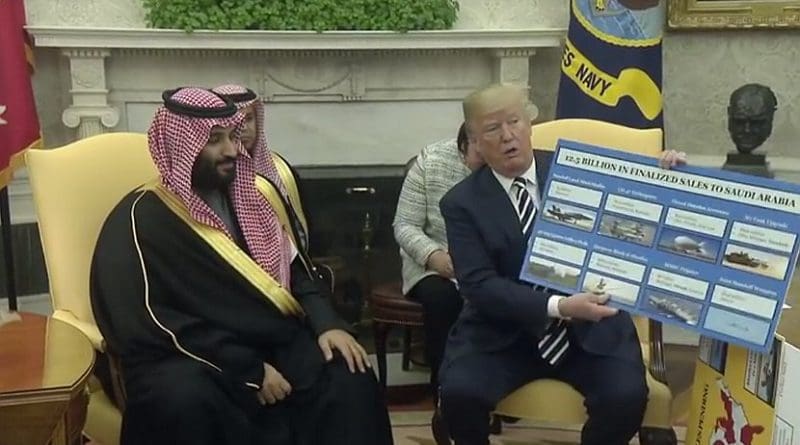The Relationship Between Money, Oil And Weapons – OpEd
By Arab News
By Abdulrahman Al-Rashed*
Relations between states are based on interests; this sentence is frequently repeated and remains valid in understanding politics. Saudi Arabia’s relationship with the United States, the region’s most established and longest lasting relationship with Washington, is no exception.
The Americans discovered oil in Saudi Arabia about 80 years ago, while other countries’ explorations failed. They established a new oil entity in Saudi Arabia in the 1930s, led by Standard Oil. The relationship between the two countries has continued; Riyadh has considered the US a strategic partner since the 1950s, and vice versa.
Naturally, the two partners cannot agree on all the issues and interests, but the relationship has been beneficial for both sides. However, it suffered a setback under the previous US administration, when US interest in this region declined and Washington’s interests in the Asia-Pacific countries were thought to be more important than those in the Middle East, including Saudi Arabia. That view did not persist after Donald Trump became president; although the relationship remains within the context of interests, regardless of expectations and the president’s identity.
Moreover, it is not true that the US is an open market for whoever wants to buy weapons, as some comments on President Trump’s statement — when he talked about arms sales in the presence of the Saudi crown prince — suggested. The US had refused to sell arms to Saudi Arabia in 1987, even though large amounts of money were involved, as well as in 2008 during the Bush administration. President Obama also stopped arming Saudi Arabia a month before he left office.
But despite these setbacks, Saudi Arabia for the most part has succeeded in winning the arguments over the supply of armaments from one of the most important manufacturers of the best weapons in the world, America. Saudi Arabia had a famous battle over AWACS aircraft in the early 1980s, which it won by a small margin of votes in Congress. Many countries’ requests to buy American weapons were refused; others failed to get the approval of Congress, while some were formulated in an impossible way, as was the case with Pakistan, which Senator Rand Paul described as a “frenemy.” Some requests were even rejected outright, as was the case with Taiwan.
The biggest challenge to Saudi Arabia was when the previous US administration decided to stop supplying ammunition and providing military intelligence, without which the air war in Yemen would be almost impossible. Together with military deals comes the special political relationship, which is just as important, and which makes countries such as Iran take extra care when dealing with the Kingdom. Consequently, interests, viewed as a balance that holds the relationship, remain generally in our favor. A relationship between two countries that is based on economic and military cooperation delivers the most desired outcome.
What distinguishes Crown Prince Mohammed bin Salman’s visit to the US is that he represents a new Saudi project — or, perhaps more accurately, a new Saudi Arabia; a country that is heading toward change, and government and community development. His project has nothing to do with America or Britain. The project of change is directed toward Saudi Arabia and the Saudis, as he himself says. This resolves the crisis of a stereotypical image and societal relations, and represents one of the problems of Saudi relations with the world as a whole. It sees him as a state modernizer and a pragmatic reformer.
The reason why he was warmly welcomed on his visit to Britain, and is now welcomed in the US, is because he began implementing his planned program two years ago. Even opponents of Saudi Arabia received him with appreciation and recognition of his seriousness. Thus, it does not matter how some may try to explain the quest to improve relations with major powers, especially, the US.
Indeed, these relations are based on historical and pragmatic foundations, including important interests and a realistic view in which each side does not expect what the other side may not be able to deliver.
• Abdulrahman Al-Rashed is a veteran columnist. He is the former general manager of Al Arabiya news channel, and former editor-in-chief of Asharq Al-Awsat.

